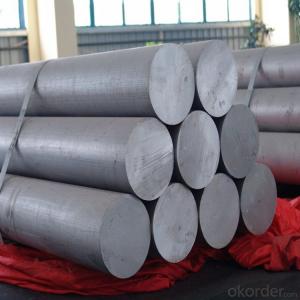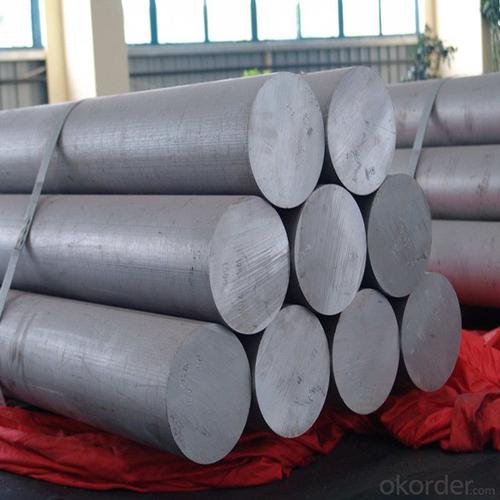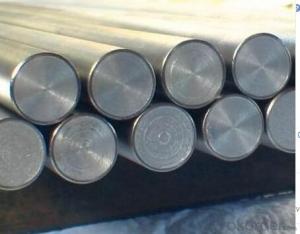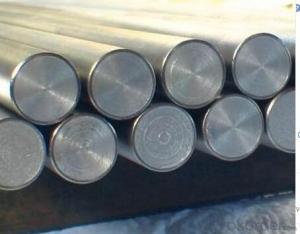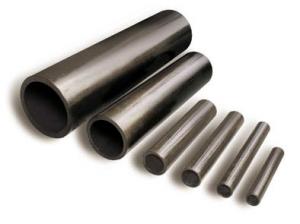high quality bearing steel, GCr15, 40Cr, SAE1055, G20CrNiMo
- Loading Port:
- China main port
- Payment Terms:
- TT OR LC
- Min Order Qty:
- 500 m.t.
- Supply Capability:
- 10000 m.t./month
OKorder Service Pledge
OKorder Financial Service
You Might Also Like
Specifications:
1) Grade: Bearing steel SAE 52100 / GCr15 round bars
2) Diameter: 20-500mm
3) Hot rolled/forged, annealed
Application:
Commom steel used to produce balls and rings of bearing. The product has characteristics of uniform-chemical composition, low percentage of harmful elements, high purity, well-distributed carbide, good surface quality. It also has characteristics of wide scope of plastic,stable heat-treatment quality, uniformand high hardness, high wear resistance,high strength of touching fatigue. It has excellent machining property afer spheroidize annealing.
The use of products The product is used to produce balls and rings of bearing. Future Development By rational rolling and cooling process, the product can be spheroidized on-line and can be used in drawing and machining directly by customers. By combining re-spheroidize annealing and re-crystallisation of semi-finished product, the steel wire process can be simplified.
Packaging & Delivery
Mark: Heat No. will be cold stamped and Steel grade, diameter (mm), length (mm), and the manufacturer LOGO and weight (kg) is painted.
Standard seaworthy packing or as customer required
Delivery time: Within 30 days after order is confirmed.
Benefits of Bearing Steels:
•Cleanliness and freedom from objectionable microscopic slag type inclusions.
•Shallow decarburized surface
•Dimensional accuracy and excellent micro-structure uniformity.
Our Advantages:
•Fast delivery
•Non-standard sizes and made-to-order
•Small min order quantity
•Economical Pricing
•Quality confirming to International Standards
•Material Test Certificates for Quality Assurance
•Technical Qualified After Sales
•Excellent Delivery Conditions.
- Q: How is special steel used in the aerospace industry?
- Special steel is used in the aerospace industry for various applications, including the manufacturing of critical components such as jet engines, landing gear, and airframe structures. Due to its exceptional strength, corrosion resistance, and heat resistance properties, special steel ensures the safety, durability, and performance of aircraft while operating under extreme conditions.
- Q: What are the different methods of surface peening for special steel?
- To enhance the mechanical properties of special steels, surface peening is employed to induce compressive stresses on the surface. This process helps improve fatigue life, resistance to stress corrosion cracking, and overall durability. Various methods of surface peening exist for special steel, including: 1. Shot Peening: This technique involves bombarding the steel surface with high-velocity spherical particles, known as shot. The impact of these particles induces plastic deformation and creates compressive stresses. Shot peening is widely used due to its effectiveness in improving fatigue life. 2. Ultrasonic Peening: Compressive stresses are induced on the steel surface using high-frequency vibrations in ultrasonic peening. These vibrations are applied through a tool in contact with the surface, leading to plastic deformation and the generation of compressive stresses. 3. Laser Peening: A high-energy laser beam is utilized in laser peening to create shockwaves on the steel surface. These shockwaves induce plastic deformation and generate compressive stresses. Laser peening is known for its precision and ability to target specific areas. 4. Cavitation Peening: By creating cavitation bubbles near the steel surface in a liquid medium, cavitation peening induces compressive stresses. The collapse of these bubbles generates high-intensity shockwaves. This method is particularly beneficial for irregularly shaped components. 5. Needle Peening: In needle peening, a bundle of fine needles is repeatedly impacted on the steel surface. This process induces plastic deformation and generates compressive stresses. Needle peening is commonly used for localized treatment of small areas. Each of these methods offers unique advantages and is suitable for specific applications. The selection of the surface peening method depends on factors like the type of special steel, component geometry, desired improvements, and available equipment. It is crucial to consider the specific requirements and seek expert advice to determine the most appropriate method for surface peening special steel.
- Q: How does special steel ensure product traceability?
- Product traceability is guaranteed in special steel through a variety of measures and processes implemented during production and supply chain management. To begin with, detailed records of the production process are maintained by special steel manufacturers. These records encompass information on the raw material source, specific production techniques utilized, and the testing and inspection procedures carried out at each stage. By possessing these records, a comprehensive traceability is achieved as they provide a clear historical account of each product from its inception to its final form. Special steel manufacturers also adopt robust quality control systems that involve assigning unique identification codes or markings to each product. These codes aid in tracking the product throughout its lifecycle, facilitating easy identification and traceability. Furthermore, advanced technology systems such as barcode scanning, radio frequency identification (RFID), or blockchain are often employed by special steel manufacturers to monitor and trace their products. These systems enable real-time monitoring and recording of product movements, thereby ensuring accurate traceability and transparency. Additionally, special steel manufacturers maintain strong relationships with their suppliers and customers, establishing a transparent and traceable supply chain. They collaborate closely with suppliers to validate the origin and quality of raw materials, while also working closely with customers to provide them with detailed information regarding the product's manufacturing process and its journey through the supply chain. In conclusion, special steel manufacturers prioritize product traceability by implementing stringent record-keeping systems, advanced technology solutions, and maintaining transparent relationships with suppliers and customers. These measures not only guarantee the quality and reliability of special steel products, but also provide customers with assurance regarding the origin and authenticity of the product.
- Q: What are the challenges in machining special steel with complex geometries?
- Machining special steel with complex geometries poses several challenges. Firstly, the hardness and toughness of special steel can make it difficult to cut, requiring specialized tools and techniques. Additionally, the intricate geometries of the components can pose challenges in terms of accessing and maneuvering the cutting tools, which may require specialized equipment or processes. Furthermore, the heat generated during machining can affect the properties of special steel, such as its hardness and dimensional stability, requiring careful monitoring and control. Overall, machining special steel with complex geometries demands expertise, precision, and adaptability to overcome these challenges.
- Q: Can special steel be used for making aerospace engine components?
- Certainly, aerospace engine components can be made using special steel. The aerospace industry commonly utilizes special steel alloys, such as nickel-based superalloys and stainless steels, due to their remarkable mechanical properties, ability to withstand high temperatures, and superior resistance to corrosion. These alloys are specifically engineered to endure the extreme conditions and demands of aerospace engines, including high temperatures, pressures, and stress levels. Moreover, special steel alloys offer a high strength-to-weight ratio, which is crucial in reducing the weight of aerospace components while preserving their structural integrity. Consequently, the utilization of special steel in aerospace engine components ensures the dependability, performance, and safety of engines in aeronautical applications.
- Q: What are the main applications of special steel in the chemical processing industry?
- Special steel has various applications in the chemical processing industry, primarily due to its excellent corrosion resistance, high temperature resistance, and strength. It is commonly used in the construction of chemical storage tanks, pipes, and reactors, where it helps to prevent leaks and maintain the integrity of the process. Additionally, special steel is utilized in the manufacturing of valves, pumps, and heat exchangers, ensuring reliable and efficient operations in chemical plants.
- Q: How does special steel perform in additive manufacturing applications?
- Special steel performs well in additive manufacturing applications due to its high strength, durability, and resistance to wear and corrosion. The unique properties of special steel, such as its ability to withstand high temperatures and extreme environments, make it an ideal material for 3D printing processes. Additionally, the flexibility and customization offered by additive manufacturing allows for the creation of complex geometries and intricate designs, further enhancing the performance of special steel in various applications.
- Q: What are the advantages of using special steel in aerospace applications?
- The utilization of special steel in aerospace applications brings forth numerous benefits. Firstly, it possesses exceptional mechanical properties and high strength, rendering it suitable for enduring the extreme conditions encountered within the aerospace industry. Its capability to withstand high temperatures, pressures, and vibrations guarantees the safety and reliability of aircraft components. Secondly, special steel offers remarkable resistance to corrosion, a critical characteristic in aerospace applications. As aircraft are exposed to harsh environments, including moisture, atmospheric gases, and various chemicals, the corrosion resistance of special steel prevents degradation and maintains the structural integrity of the aircraft. This, in turn, reduces the frequency of maintenance and repair requirements. Furthermore, special steel exhibits excellent fatigue resistance, enabling it to endure repeated loading cycles without compromising its structural integrity. This characteristic is particularly significant in aerospace applications, where components are subjected to cyclic loading due to takeoffs, landings, and turbulence. By utilizing special steel, the risk of fatigue failure is significantly minimized, ensuring the longevity and safety of the aircraft. Moreover, special steel offers favorable weldability and formability, allowing for the production of intricate and complex aerospace components. This flexibility in manufacturing processes permits customization and optimization of designs, resulting in lightweight yet robust structures. The incorporation of special steel in aerospace applications contributes to overall weight reduction of aircraft, thereby enhancing fuel efficiency and increasing payload capacity. In conclusion, the advantages of employing special steel in aerospace applications encompass its high strength, exceptional mechanical properties, corrosion resistance, fatigue resistance, weldability, and formability. These characteristics make it an ideal material for withstanding the demanding conditions experienced in the aerospace industry, ensuring the safety, reliability, and efficiency of aircraft.
- Q: How does mold steel resist wear and erosion?
- Mold steel resists wear and erosion due to its high hardness and toughness properties. The steel is specifically designed to withstand the repetitive stress, abrasion, and impact that molds are subjected to during their operational lifespan. Additionally, mold steel is often treated with heat treatments or coatings to further enhance its resistance to wear and erosion, ensuring its durability and longevity in molding applications.
- Q: What are the properties of titanium alloys?
- Titanium alloys have several notable properties. First, they are known for their exceptional strength-to-weight ratio, making them highly desirable in industries such as aerospace and automotive engineering. They also exhibit excellent corrosion resistance, even in harsh environments, which contributes to their durability and longevity. Additionally, titanium alloys possess a high melting point, allowing them to retain their structural integrity at elevated temperatures. These alloys are also biocompatible, making them suitable for medical applications such as orthopedic implants. Overall, titanium alloys combine strength, lightness, corrosion resistance, high melting point, and biocompatibility, making them versatile and valuable materials in various industries.
Send your message to us
high quality bearing steel, GCr15, 40Cr, SAE1055, G20CrNiMo
- Loading Port:
- China main port
- Payment Terms:
- TT OR LC
- Min Order Qty:
- 500 m.t.
- Supply Capability:
- 10000 m.t./month
OKorder Service Pledge
OKorder Financial Service
Similar products
Hot products
Hot Searches
Related keywords
